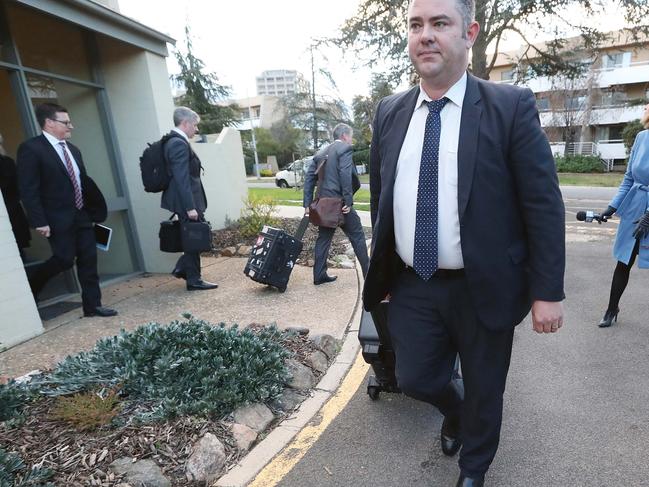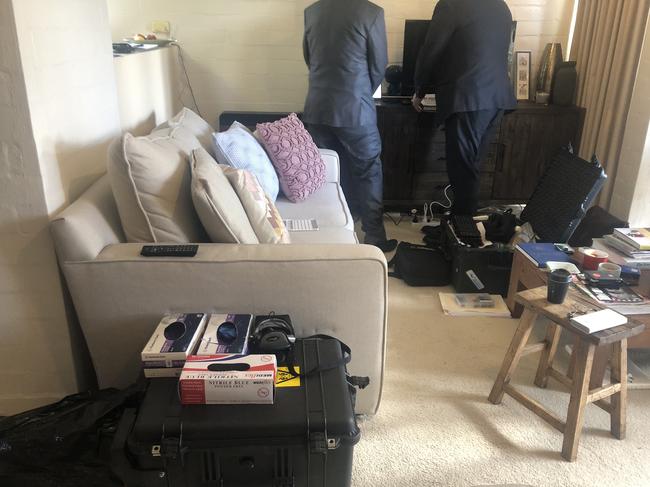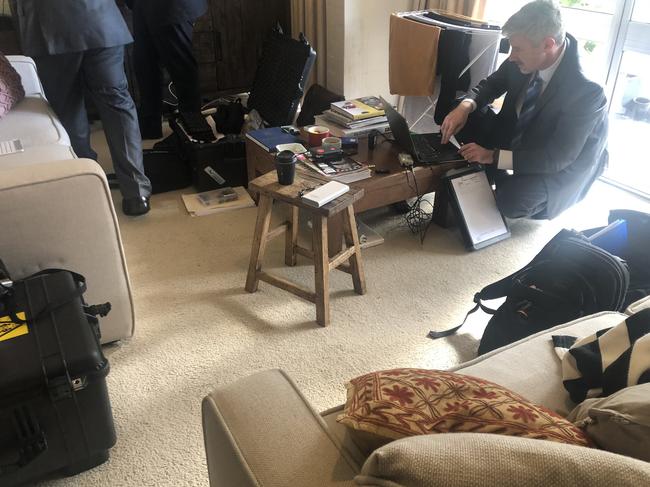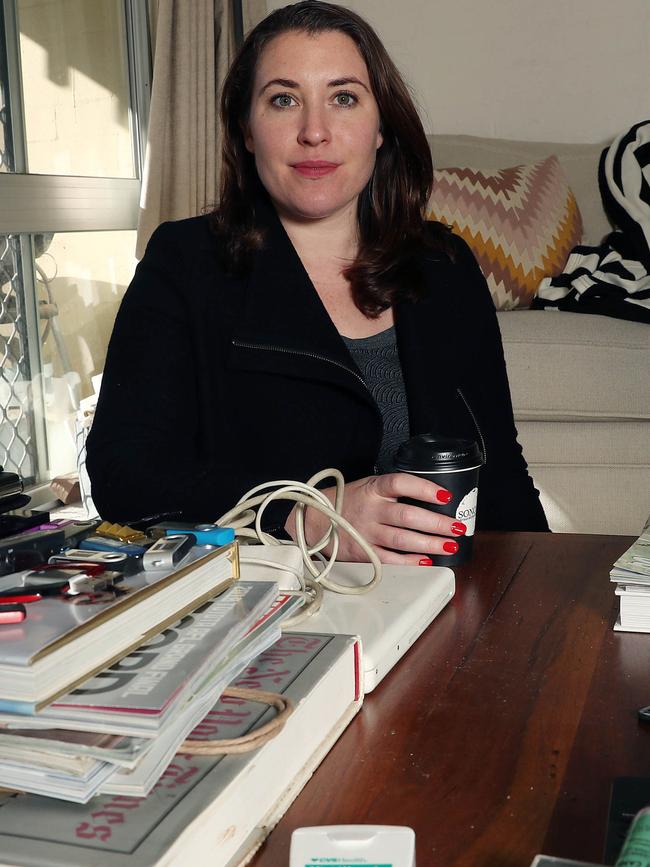Annika Smethurst: What happens when the police raid your home
In an excerpt from her memoir, award-winning journalist Annika Smethurst recounts the knock on her door from the AFP that made headlines around the world.
Stellar
Don't miss out on the headlines from Stellar. Followed categories will be added to My News.
- Erin Molan: ‘Marriage is the last thing on our minds’
- Melissa George: ‘So broke I couldn’t even afford a baguette’
It was around 9am and I was about to rush out of my apartment when I heard a knock on my door. “That must be the cleaner,” I thought.
Without hesitation, or my usual peek through the peephole, I opened the door.
But it wasn’t Phil the cleaner – it was five members of the Australian Federal Police who had a warrant to raid my home.
There on my landing, three male and two female police officers in plainclothes introduced themselves. For a law-abiding citizen like myself, I had assumed such an early morning visit from the police would mean a member of my family had perished in a tragic boat accident or something equally horrific.
Thankfully that wasn’t the case.

Shock has erased the first few words they said to me.
I recall an identification badge being thrust in my face, closely followed by a warrant to search my home. Manners and fear prevented me from putting up a fight, so I let them in. Since that day I have often wondered why I wasn’t bolshier or less cooperative.
I am a journalist; it’s in our nature. But I had been brought up to trust the police and obey their orders, so I invited them in.
Perhaps it was a survival mechanism, but on that day my brain wouldn’t let me think about the impact this raid might have on the days, months and years to follow.
I somehow miscalculated the significance of what was happening and even tried to explain to the police that a man named Phil was coming over to give me a quote for some cleaning and it’d be inconvenient to cancel, as they had suggested.
Once the AFP knew I was home, they called two more policemen – IT experts – to my apartment.
Inside, I was handed a copy of a story I had written more than a year ago and they reproduced the warrant, which appeared to give the police permission to search my property, my car, my phone and my computer.

According to the warrant, the police wanted notes, storyboards or scribblings – my words, not theirs – relating to an article published in The Sunday Telegraph a year earlier, which revealed a proposal to allow our own military spies at the Australian Signals Directorate (ASD) to spy on Australians within Australia, not just foreigners as had always been the case.
At the time I knew this article caused a stir among political circles, but more than a year had passed. We had a new prime minister, there had been an election and a new parliament was about to start.
There is huge value in knowing what you don’t know.
And that morning I knew I needed help. I asked to make a phone call. I had been given advice early in my career about what to do if the police ever showed up, most of which I had forgotten. But I knew I needed a lawyer.
With the police just metres away, I spoke to my deputy editor who was at the school uniform shop with her children in Sydney.
As soon as I told her the police were at my house, she responded, “Is this about that story you wrote last year?”
“Yes,” I replied.
I tried calling my parents to let them know what was happening before they saw it on the news. It didn’t work.
News Corp, my employer [publisher of Stellar], sent two Canberra-based lawyers to my house to provide legal representation and moral support.
I will never be able to thank these two kind and professional people enough for the support they provided me that day.


Moments before the lawyers reached my door, the police started the search.
In a strange sign of respect that conflicted with what was about to happen, the two female officers were assigned to search my bedroom from top to bottom.
My bedding was removed and cupboards emptied. The two officers meticulously explored the contents of my underused handbags, reuniting me with long-lost lipsticks and unsuccessful TAB receipts from modest bets placed during the Spring Racing Carnival.
I couldn’t watch, but then I couldn’t look away.
I would briefly walk into the room and justify whatever item they were looking at, like I needed to explain to the police why I had so many scarfs, or why I had kept a Paris metro ticket from a school exchange program in 2004.
As is now committed to the annals of Wikipedia, the police also searched my undies drawer.


As Sky News host Laura Jayes said on-air at the time: “Never has there been so much focus on one journalist’s underwear drawer.”
Much has been made about this in the media, but it was far from the worst thing to happen that day.
Would you prefer strangers look through your bras and briefs, or the contents of your bathroom cupboard and private text messages?
I was forced to hand over the passcode to my mobile phone.
At the risk of further damaging the reputation of Millennials, giving police access to my iPhone – and therefore my text messages, search history and screenshots – filled me with incredible anxiety.
It might not sound like a hardship and doesn’t deserve comparisons to the horrifying violence inflicted by some countries on journalists, but this was an incredible intrusion.
It didn’t just expose police to my private thoughts and opinions, but to the secrets my friends, family, colleagues and contacts chose to trust me with.
After handing over my iPhone, the police copied the entire contents of the handset onto a computer.
For hours they sifted through text messages, photos and notes using keyword searches and time stamps, in search of anything that might be relevant to their investigation.


I sat, legs crossed, on my kitchen bench next to the sink, as it was the only space that wasn’t being pulled apart by the police.
I could hear my phone dinging with alerts as news of the raid made its way around the world. I was trying not to cry.
I had wanted to keep it all a secret because I didn’t want to worry anyone, least of all my family and friends.
It was too late for that. I have always been a people-pleaser. I have always been afraid of letting others down.
The sun started to drop and the lights went on.
Neighbours in my apartment block returned home from work only to be greeted by hordes of reporters. Then, after seven hours, the raid was over.
Again, I sat at my dining table, only this time I was surrounded by seven police officers and two lawyers as they showed me the text messages that had been removed from my phone and copied onto a USB stick.
Then they were gone.
It was still and silent and I cried until I had no more tears left.
I couldn’t watch the news or turn on the radio – a symptom that lasted for an inconveniently long period of time for a journalist.
I didn’t want to take calls from anyone because I wasn’t sure I could pretend it was going to be OK. I just wanted to undo that day.
I wanted to hide under my doona, so that is what I did.
On Secrets by Annika Smethurst (Hachette Australia, $16.99) is available on May 26.
Read more www.stellarmag.com.au
